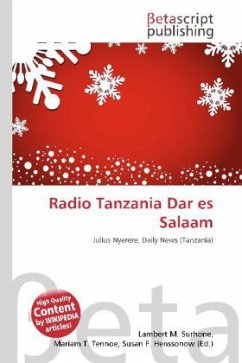
Radio Tanzania Dar es Salaam
Versandkostenfrei!
Versandfertig in 6-10 Tagen
19,99 €
inkl. MwSt.

PAYBACK Punkte
10 °P sammeln!
Please note that the content of this book primarily consists of articles available from Wikipedia or other free sources online. In 1973, when the government of Tanzania was under the control of Julius Nyerere''s leadership, the country was primarily focused with establishing ujamaa, which means a socialistic familyhood. Accordingly, in an effort to get the citizens of Tanzania to develop their own unique popular music culture, Nyerere and his government banned most foreign music on national programs in 1973. Radio Tanzania Dar Es Salaam (RTD) became critical to the cultural life of Tanzania by...
Please note that the content of this book primarily consists of articles available from Wikipedia or other free sources online. In 1973, when the government of Tanzania was under the control of Julius Nyerere''s leadership, the country was primarily focused with establishing ujamaa, which means a socialistic familyhood. Accordingly, in an effort to get the citizens of Tanzania to develop their own unique popular music culture, Nyerere and his government banned most foreign music on national programs in 1973. Radio Tanzania Dar Es Salaam (RTD) became critical to the cultural life of Tanzania by nurturing Tanzania''s music scene. Since there was a chronic shortage of studio space and production equipment, RTD became the main advocate of Tanzanian musicians. In addition to the creation of the RTD, in 1974 the government of Tanzania created BAMAUTA, which coordinated official national music policies, controlling musical instrument imports and issues club and discothèque licences.












